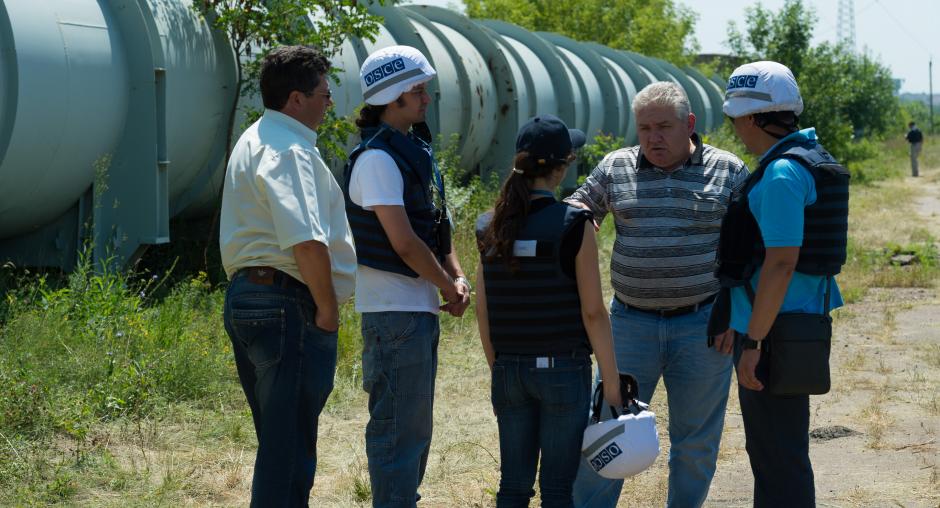OSCE makes progress restoring access to running water in Donetsk region
Due to shelling in Donetsk region, the main water supplies have been damaged and approximately 2.5 million people are suffering from severe shortages of running water. This adds another challenge to the daily lives of the local population, including residents of the most populous cities such as Mariupol area, Yenakiieve, Vuhlehirsk and Krasnosarmiisk. Locals have been experiencing restricted access to running water for more than a month.
Reduced access to water not only poses health risks, it also has economic implications, as people are unable to irrigate crops or raise livestock. This is something the monitors of the OSCE Special Monitoring Mission (SMM) to Ukraine know only too well, speaking with locals on a daily basis. As one monitor, Paul, said: “Something had to be done.”
Ceasefire enables repairs on the pipeline
The water distribution company, Voda Donbassa, located in an area controlled by the “Donetsk People’s Republic”, asked the SMM for help in facilitating a ceasefire so that its workers could start repair work on the pipeline, and restore access to running water.
A representative of Voda Donbassa, who wished to remain anonymous for security reasons, said that the company had lost half of its water reserves. “The situation is catastrophic and we need the presence of the OSCE to have access to repair the pipeline safely. Without this work, the consequences could be fatal for the local population,” he said.
The situation is catastrophic and we need the presence of the OSCE to have access to repair the pipeline safely. Without this work, the consequences could be fatal for the local population
Representative of Voda Donbassa
The SMM facilitated dialogue between the two sides, resulting in an agreed local ceasefire everyday between 10:00 and 17:00hrs. Thanks to these efforts, repair work near “DPR”-controlled Horlivka, and government-controlled Maiorsk, went ahead. “We emphasised that the repair of the water pipeline is in everyone’s interest”, said Paul.
Workers from Voda Donbassa everyday repair the pipelines under the scorching sun, working to a tight schedule. One worker, who also spoke on condition of anonymity, told the SMM monitors that their work is dangerous as shelling can start at any moment. “But we also understand the importance of our work for the population,” he said. “They are counting on us.”
Extent of damage
500,000 cubic metres of water a day are lost due to pipeline damage
The amount of leaked water is enough to cover the daily water needs for two cities the size of Donetsk
Five anti-tank mines were discovered in the area where the repair work took place and later neutralized
Demining comes first
Every day, SMM monitors from Donetsk visit Horlivka to observe how the repairs have progressed and to assess the security situation. In the morning, before the arrival of 40 workers from Voda Donbassa, the monitors work with the local emergency service personnel involved in demining the area. Simultaneously, SMM monitors from the other side of the Line of Contact, in Maiorsk, are present near the pipeline to observe the ceasefire.
“The importance of our facilitation during the repairs is acknowledged by the locals on both sides of the contact line. People need running water. The repairs will certainly improve the situation for families living in the conflict area,” Paul said.
Safety and security under SMM supervision
According to the Voda Donbassa representative, “When the OSCE SMM is here, my workers feel safer. The presence of SMM monitors is essential for our work”.
Local residents also told the SMM monitors that their presence brought a much-needed lull in the fighting. One of them who gave his name as Denys said, “When OSCE monitors come, there is less shelling.”
As Paul noted, water scarcity makes the life of the civilians already suffering from the conflict even worse. “That is why it is important to have a constant ceasefire to avoid problems that negatively affect the basic needs of the population. Having access to drinking water is essential and shelling of water facilities should not happen anymore,” Paul said.












